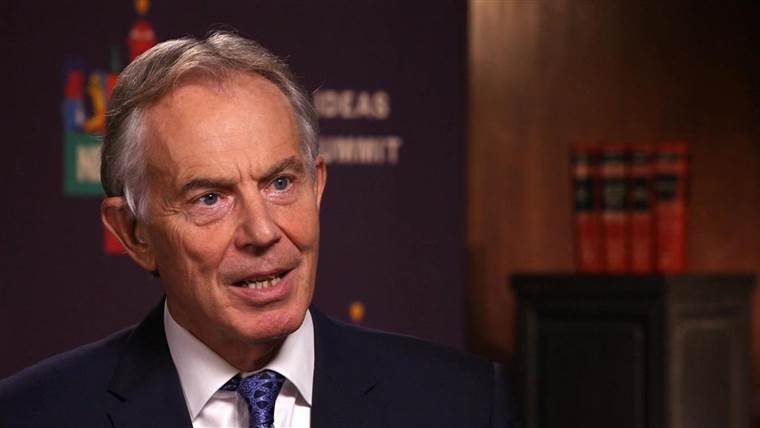Tony Blair, the former Prime Minister of the United Kingdom, is a figure whose political legacy invites scrutiny from various perspectives, especially within the context of contemporary Christianity. His tenure, which lasted from 1997 to 2007, marked a significant era not only in British politics but also in the relationship between governance and faith. To understand Blair’s impact, it is essential to delve into his religious beliefs and how they shaped his policies and vision for Britain.
Born into a devout Christian family, Blair’s upbringing played a pivotal role in forming his moral compass. He was raised in the Church of England, a tradition that emphasizes a modern understanding of faith intertwined with practical life. This background imbued him with values that he later articulated during his political career. At the core of his beliefs was a commitment to social justice and equality—principles that resonated deeply with Christian doctrines. His agenda, often described as ‘New Labour,’ sought to address the societal disparities that plagued Britain, reflecting the Biblical call to serve the marginalized.
During his administration, one of the most notable aspects was the focus on social policy reform. Utilizing his platform, Blair endeavored to elevate the standards of education, healthcare, and social care. This alignment with Christian tenets—particularly the imperative to care for the poor and the vulnerable—demonstrated that his Christian faith influenced his governance. His vision of a ‘Third Way’ positioned him as a mediator between traditional left and right ideologies, aiming to balance individual liberties with collective responsibility.
Yet, Blair’s legacy is not without its controversies. The decision to join the United States in the invasion of Iraq in 2003 fundamentally altered public perception of his leadership. While he justified the war on grounds of humanitarian intervention and the fight against terrorism, many Christians, both in the UK and worldwide, felt a deep dissonance between his actions and the teachings of Christ. The question remains: how could a leader grounded in Christian faith reconcile the principles of “Thou shalt not kill” with the imposition of military force? This juxtaposition prompted a profound shift in the perception of his moral integrity.
Indeed, the Iraq War initiated a broader discourse on the ethics of interventionism, particularly among Christian communities. Many believers began re-evaluating the implications of “just war” theory—a doctrine rooted in Christian ethics that seeks to establish the conditions under which warfare can be morally justified. In doing so, Blair inadvertently opened a Pandora’s box of theological reflection regarding the role of faith in global politics. Did the ends justify the means? Or were the tragic consequences of war irredeemable under any rationale?
This ethical quandary catalyzed debate within church circles. Some saw Blair as a political leader upholding Christian ideals of freedom and justice; others perceived him as a betrayer of those very principles. It became apparent that the blending of faith and politics could yield both noble intentions and dire outcomes. As a result, Christian leaders and laypersons alike engaged in dialogues that examined the responsibilities of citizenship in a world fraught with moral complexities.
Moreover, Blair’s personal journey after leaving office sheds light on his continual grappling with faith. He embraced a different relationship with Christianity, speaking openly about the necessity of understanding one’s faith in the context of modern societal challenges. In his writings and public speeches, Blair has often articulated his belief in the importance of moral leadership—a notion that resonates deeply with Christian doctrine. His reflections serve not as dogma, but as a testament to the ongoing struggle between faith and reality in the tumultuous realm of politics.
As Blair transitioned from a political leader to a global statesman, his legacy took on new dimensions. He founded the Tony Blair Faith Foundation, which aims to encourage dialogue between religions on pressing issues. This initiative reflects a broader understanding of faith in public life, advocating for coexistence and mutual respect among diverse religious perspectives. Such efforts highlight the ongoing relevance of Blair’s faith, illustrating that the intersection of spirituality and politics could engender positive change around the globe.
In retrospect, examining Tony Blair’s legacy through a Christian lens offers nuanced insights into the complexities of political leadership. His achievements in social policy and his misguided military interventions both underscore the struggle inherent in reconciling faith with governance. The invitation to reflect on his impact prompts deeper questions about the role of Christians in positions of authority and the ramifications of their choices.
Ultimately, Blair stands as a testament to the inherent contradictions within political spheres, particularly for those who claim a Christian worldview. While he sought to embody the principles of Christianity in public service, the dichotomy of his decisions invites a collective inquiry into the nature of ethical leadership. As Britain and the world navigate ongoing social and political turbulence, the legacy of leaders like Tony Blair serves as a compelling narrative that challenges believers to wrestle with their faith in the public arena.
The exploration of such legacies ensures that the church remains engaged with the world’s complexities. It urges contemporary Christians to navigate their convictions while being mindful of the broader implications of their faith expressed through political action. As we reflect on Tony Blair’s time in office, we must continue to ask ourselves: How can we promote justice, peace, and compassion amidst the often turbulent waters of politics? This is the essential question that Blair’s legacy compels us to consider.



